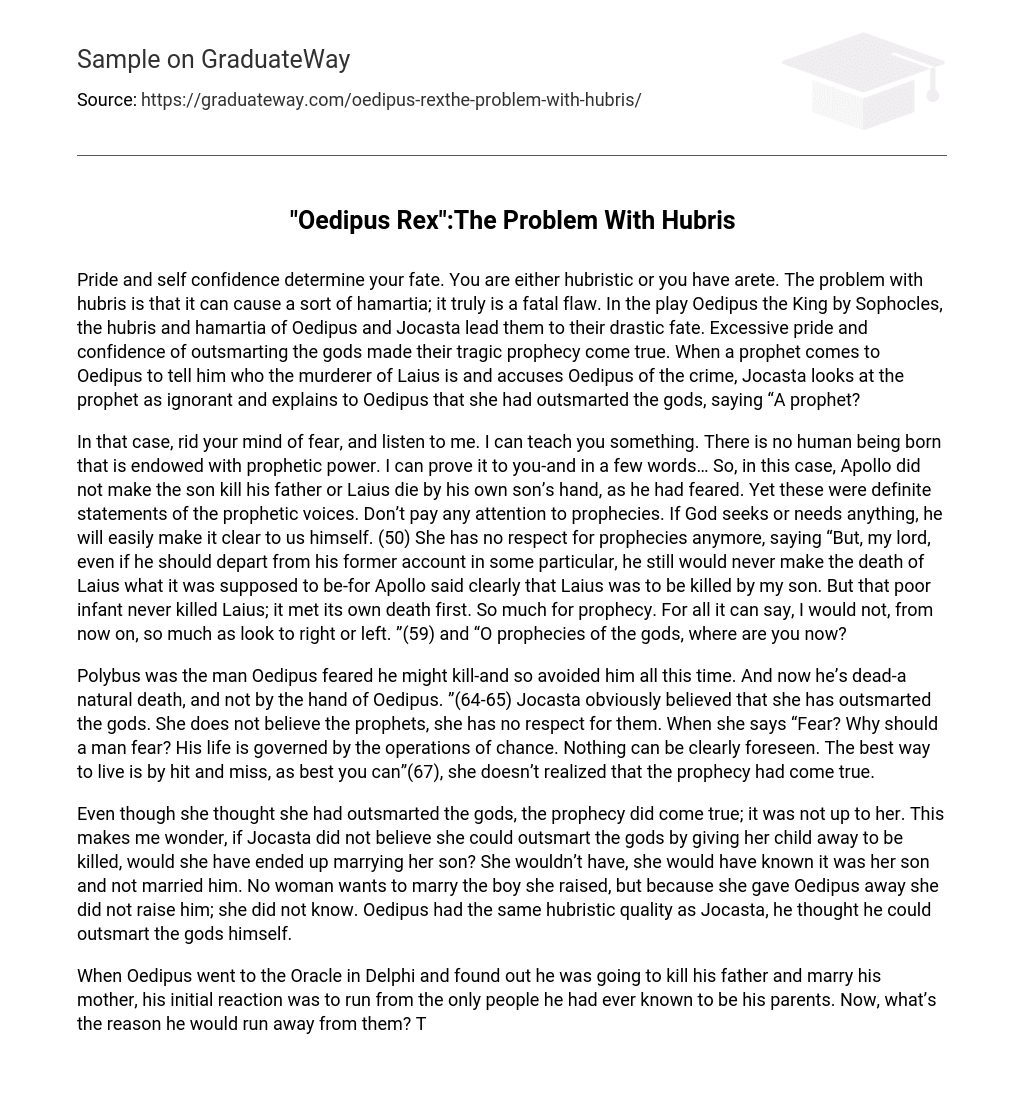The fate of a person is determined by their pride and self-confidence, which can result in either arrogance or excellence. However, arrogance can be a fatal flaw, as demonstrated in Sophocles’ play Oedipus the King. The excessive pride and confidence of both Oedipus and Jocasta ultimately lead to their tragic destiny. Their belief that they could outsmart the gods leads to the fulfillment of their tragic prophecy. When a prophet accuses Oedipus of killing Laius, Jocasta disregards the prophet as ignorant and proudly asserts that she had successfully deceived the gods.
In this scenario, I encourage you to dismiss fear and heed my words. I possess the ability to educate you. The gift of prophecy is not inherent in anyone from birth. I can persuasively demonstrate this fact. Consequently, Apollo did not instigate the son to slay his father, and Laius did not perish at the hands of his own offspring as he dreaded. Despite these explicit proclamations by prophetic voices, it is unnecessary to give attention to prophecies. If God desires or requires anything, He will effortlessly convey it directly to us. (50) She no longer esteems prophecies and states, “Even if he were to alter his previous narrative in any manner, Laius’s demise would still not have occurred as foretold – for Apollo explicitly stated that my son would be responsible for taking his life. However, that unfortunate infant never caused Laius’s death; it perished before him. That marks the boundary of prophecy. Henceforth, I will refrain from looking in any direction – whether left or right.” (59) and “Oh gods’ prophecies, where are you now?”
Polybus, whom Oedipus feared he might kill, was avoided by him all this time. However, now that Polybus is dead, it was not by the hand of Oedipus but rather a natural death. Jocasta, with her obvious belief that she has outsmarted the gods, does not trust or respect the prophets. In her statement, “Why should a man fear? His life is governed by the operations of chance. Nothing can be clearly foreseen. The best way to live is by hit and miss, as best you can” (67), she fails to acknowledge that the prophecy had indeed come true.
Despite thinking she had outsmarted the gods, the prophecy did come true for Jocasta, proving that it was beyond her control. This leads to the question: if Jocasta hadn’t believed she could deceive the gods by giving away her child to be killed, would she have still ended up marrying her son? The answer is no – she would have recognized him as her son and avoided marrying him. No mother wants to marry the boy she raised, but since Jocasta gave Oedipus away, she never raised him and remained unaware of his identity. Oedipus, similar to Jocasta, also possessed the audacity to believe he could outsmart the gods.
Upon learning from the Oracle in Delphi that he would commit patricide and incest by marrying his mother, Oedipus’s immediate reaction was to flee from the individuals he had always believed to be his parents. But why would he choose to distance himself from them? It was in order to outmaneuver the gods and avoid his tragic fate. Oedipus was so convinced that he had successfully outsmarted the gods that he disregarded all indications that the prophecy had been fulfilled. Whether it was an intoxicated man disclosing his adoption or Tiresias proclaiming, “Unbeknownst to you, you are engaging in an intimate relationship with your closest kin,” Oedipus chose to dismiss these warnings.
Jocasta informs him that a prophecy was once conveyed to Laius, though she clarifies that it did not originate directly from Apollo but from his priests. The prophecy foretold Laius’s death at the hands of his own son, who would be conceived by Jocasta and himself. According to the tale, Laius was ultimately slain by foreign bandits at a crossroads. Additionally, their infant son was abandoned with bound ankles in the trackless mountains merely three days after his birth. These events serve as indications that he has tragically fulfilled his predetermined fate and potentially even committed the murder of Laius.
If Oedipus had chosen to remain in Corinth and resist the urge to kill Polybus or marry his wife, he would never have encountered his biological parents. Jocasta’s tragic flaw was her arrogance in believing she could deceive the gods by abandoning her child. Similarly, Oedipus’ tragic flaw arose from his arrogance in believing he could defy the gods by escaping his destiny. In both instances, had they not attempted to outwit the gods, they would have avoided stumbling right into the path set by divine intervention.





